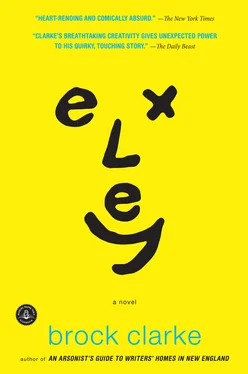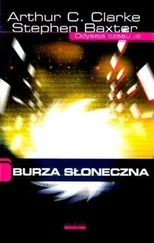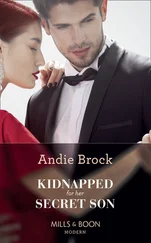“My mother works here,” I said just to say something.
“No kidding,” Mr. S. said.
“But I’ve never been here before.” This was true. Whenever I asked about whether I could see where she worked, if I could see her office, Mother said, “It’s not much to look at.” After the first couple of times, I’d stopped asking.
After a few more minutes of fence, we came to a sign that said, FORT DRUM: AUTHORIZED VISITORS. It was attached to two poles. In between the two poles, and under the sign, was a gate. The gate was also a fence, but it was on wheels. It was closed. There was no one around who seemed like he’d be the person to open it. There was no one around at all that I could see. Mr. S. pulled the van over to the side of the road, unbuckled his seat belt, and looked at me. “How about some help?” he said, and then jerked his thumb back toward the rest of the van. I saw the wheelchair was there, strapped to the wall of the van. I got out of my seat, freed the wheelchair, backed it in the direction of Mr. S. He’d swiveled his seat — the van seats could swivel, apparently — and with some help from me he managed to get into the chair, which he then pushed toward the back of the van. When he got to the back of the van, he reached down and grabbed what looked like a stick and a traffic cone, put them both in his lap, then stared at the door. I was still standing toward the front of the van. I didn’t know what to do with my hands, so I put them in my front pockets. But then that didn’t seem right, so I put them in my back pockets. That seemed worse. I felt like a doofus. I didn’t know what was wrong with me.
“Hey!” Mr. S. yelled. “Can you at least push the goddamn button?”
I walked to the driver’s seat, saw there was a button labeled Rear Door, and pushed the button. I kept my finger on it until the platform was all the way out and then kept my finger on it until the platform lowered to the ground. Then I ran around and watched Mr. S. wheel himself off the platform. Mr. S. had a megaphone in his lap (it wasn’t a traffic cone after all) and was holding a sign with a big stick attached to it, which I couldn’t read because it was turned backward. Once Mr. S. was way away from the van, he told me to push the button again. I did, and the platform disappeared inside the van. “What are we doing here?” I asked Mr. S., but he didn’t answer. Instead, he handed me the sign. I turned it around and looked at it. It said NO MORE WAR in big red letters.
“I hear you’re pissed off,” Mr. S. said.
“What?” I said. I was still looking at the sign. I’m not sure I’d ever held one before. It was weird to think about that. A month or so earlier, Mother and I had watched one of the election conventions on TV. We watched it for about a minute before Mother said she couldn’t stand it anymore and turned the TV off. But I’d seen enough to know what to do when you’re holding a sign attached to a stick. I started raising and lowering the sign like I’d seen them do on TV.
“I hear you’re pissed off,” Mr. S. said. I still didn’t understand what he was talking about. He put his mouth to the megaphone and said into it, “ABOUT WHAT AMERICA HAS DONE TO ME AND YOUR DAD.”
“Oh,” I said, because I remembered yelling something like that to Mr. S. at the VA hospital. Suddenly, I felt like an even bigger doofus than before. I wanted to give Mr. S. back his sign, but I didn’t know how to do that without making him mad or hurting his feelings or something else I hadn’t even thought of yet. Mr. S. had lowered the megaphone, and I could see his face. He smacked his lips a few times and then stared at me. For the first time, Mr. S. seemed to me like someone who could hurt someone else. I wondered if he was the one who had given J. her scar. For the first time, I was scared of him. But I just couldn’t stop myself from lowering and raising the sign. It was like the sign was doing it on its own.
“Here they come,” Mr. S. said. I turned away from him and saw two people walking toward us. They were both dressed head-to-toe in camo — even their ski hats were camo, even their boots. I thought they were soldiers at first, but when they got closer I saw that they weren’t. One was a woman. Her cheeks were round and fiery red; her gray hair peeked out from under her ski hat. She was holding a cardboard sign with the words NO MORE WAR written on it in red marker, with a green peace symbol underneath. The other protester was a man. He had a long gray beard, and his mustache looked wet, like his nose had been running into it. As he walked, he was yelling, “NO MORE WAR,” into his bullhorn. When they got close enough, I could see that she was also chanting, “NO MORE WAR,” but not into a bullhorn, so I couldn’t hear her. I bet she couldn’t even hear herself.
“We heard your bullhorn and came right over,” the guy with the bullhorn said, although not through the bullhorn, which he’d holstered. The holster was a big brown piece of leather with a wide bottom. It looked like something Robin Hood would drink out of. It was held in place by an orange power cord around the guy’s waist. Instead of a normal belt buckle, the cord was held in place by its prongs and holes. There were other brown leather holsters of different sizes attached to the cord, spaced a few inches apart. One was holding a thermos. One was holding a cell phone. One was holding something in tinfoil. Maybe it was a sandwich.
“Would you look at those holsters,” Mr. S. said.
“Well, I made them myself,” the guy said, obviously so proud. He seemed like he was about to tell us all about how he’d made them and why, when the woman sighed. I’d heard Mother sigh like that, when my dad was about to say something she’d probably heard before, something that came right out of A Fan’s Notes . I wondered if she was the guy’s wife. I wondered how many times she’d heard about his holsters. Anyway, she interrupted him and said to Mr. S., “Did that happen to you. ”
“Iraq,” he said. “It happened to me in Iraq.” Mr. S.’s voice was calm when he said this. No one had said anything to me yet. As far as I could tell, the two of them hadn’t even noticed me standing there, raising and lowering and raising my sign. That no one noticed me doing it made me feel even more stupid than when I couldn’t stop myself from doing it. I put the point of the stick on the ground between my legs and rested the sign against my stomach.
“We’re proud of you,” the woman said. “We feel it’s important you know that.”
“OK,” Mr. S. said.
“This”—and here she tapped her sign with the hand that wasn’t holding it—“this doesn’t mean we’re not proud of you.”
“Thank you,” Mr. S. said. His voice still sounded calm. When he said, “Thank you,” it sounded like he really meant it.
“We know you didn’t want to be there any more than we want you to,” she said.
“But I volunteered,” Mr. S. said.
“You didn’t think you were volunteering for. ” The woman didn’t finish her sentence. She didn’t need to. She looked sadly at Mr. S., at his wheelchair, at his stumps, which weren’t even covered by a blanket. He was wearing sweatpants; the legs had been cut off and tied up with rubber bands.
“What did I think I was volunteering for, then?” Mr. S. asked.
Then the woman didn’t look sad anymore. She looked disappointed, like Mr. S. wasn’t the person she thought he was. She looked at Mr. S. the way Mother looked at me when I lied to her about going with my dad to the zoo.
“Why are you even here?” she asked.
“Because of junior here,” Mr. S. said. He pointed his megaphone in my direction. “He thinks his dad has been. what was it again?”
“I don’t remember,” I mumbled. I picked up my sign so that most of my face was behind it.
Читать дальше












